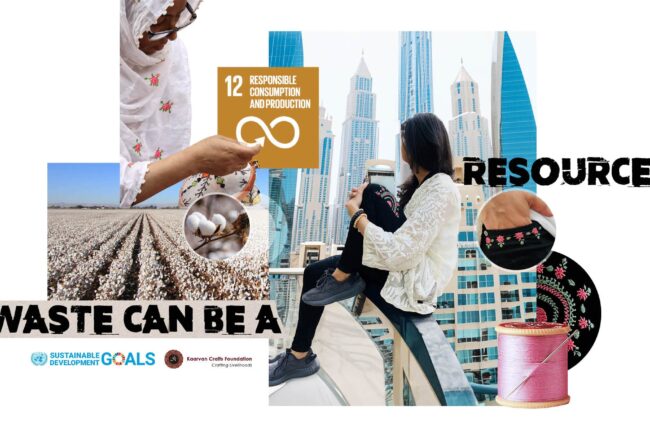Over time, we have been witnessing (and participating in) an unwarranted increase in the production and consumption of clothing that is putting undue strain on our resources. We consume, process, and toss out too fast, unsustainably. As we are just beginning to understand the ramifications of filling our planet with stuff and only starting to look at methods, mindsets, and technologies to change this (such as recycling, upcycling, and circularity), it’s reasonable to assume that nearly everything discarded over the past few decades still exists somewhere on this earth, likely to be buried in landfills or polluting our oceans.
Can we give existing clothes a new lease of life?
Materials are often wasted during the production process. Waste can be a resource! Through a strategic partnership with UN Women and Inditex (a multinational clothing company), Kaarvan is addressing the linkages between climate change and women’s rights and empowerment in the apparel industry. Inditex provided Kaarvan with hundreds of jeans that were going to be discarded. Kaarvan distributed these jeans among the artisan-entrepreneurs in the remote rural and urban slum areas of Lahore, Gujranwala, Sialkot, Kasur, Multan, Bahawalpur, Rahim Yar Khan, and Dera Ghazi Khan. Each woman artisan-entrepreneur gave a unique artist flair and life to the discarded jeans. One could clearly see their indigenous skills and talents coming to life as they mended jeans through patchwork of applique embroidery, cross-stitch, beadwork, kacha pakka tanka, gota patti applique, fabric painting, and ajrakh patchwork.

Through this initiative, we are instilling the value of upcycling and circularity within the rural community. I value that repairing clothes is a practical, symbolic, aesthetic, original, creative, trendsetting, badass, revolutionary way to say my clothes are me, my chosen skin, my principles, and my story. Long live my clothes.
“Fast Retailing is committed to ensure that all women who are main players in our business can fully demonstrate their abilities. This is essential for the sustainable growth of the entire supply chain, as well as to continue to offer products that meet customer expectations,” said Tadashi Yanai, Chairman, President and CEO, Fast Retailing Co., Ltd. “Through our joint project with UN Women, we aim to create an enabling environment for all women in our business and those in our company to play an active role in society.”1
Care for and disposal of our clothes is everyone’s responsibility. Repair and mending signify not an inability to buy something new but rather an acknowledgment that we cannot afford to discard items carelessly. When it comes to clothes, choosing where they will end up is as important as knowing where they come from.
